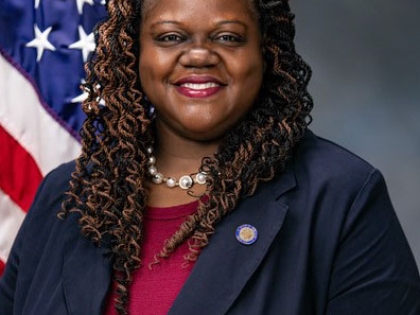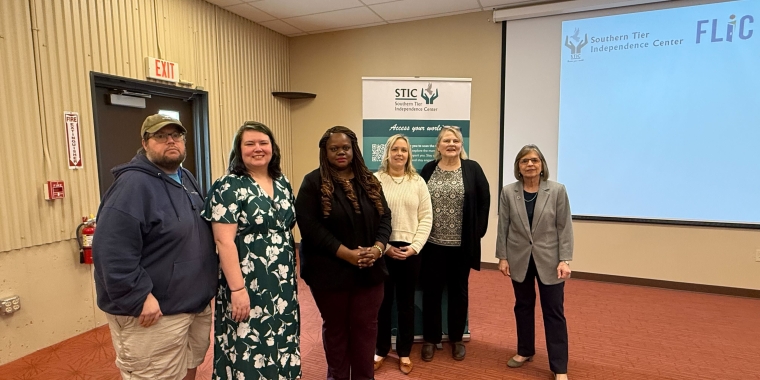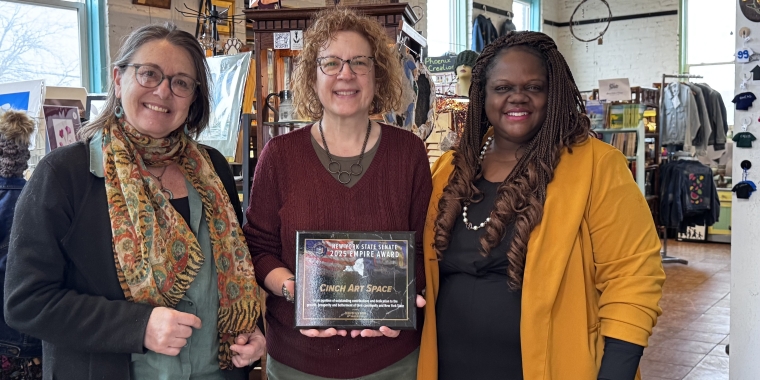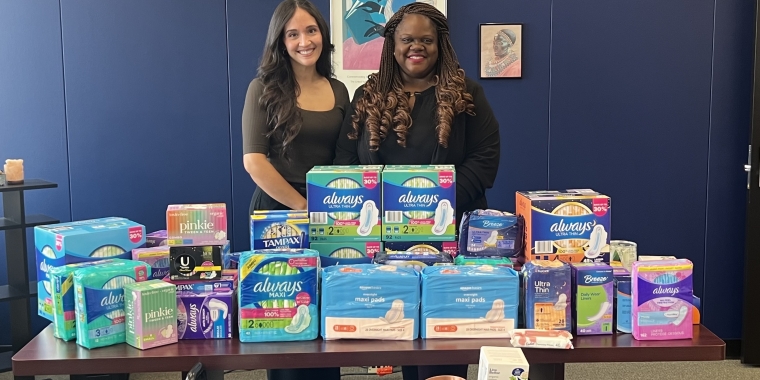
Senator Lea Webb, Assemblymember Donna Lupardo, Home Healthcare Providers and Consumers Call for Accountability, Transparency, and More Time for the CDPAP Transition
March 31, 2025
-
ISSUE:
- CDPAP

(Binghamton, NY) Today, State Senator Lea Webb was joined by Assemblywoman Donna Lupardo and consumers and providers of the Consumer Directed Personal Assistance Program (CDPAP) program from Broome, Cortland, and Tompkins County to call attention to widespread issues with New York’s transition to the programs new fiscal intermediary Public Partnerships LLC (PPL). Speakers cited ongoing issues with PPL’s transition, including an ineffective online portal, long wait times, dropped calls, lack of follow-up from PPL, and insufficient support for consumers and providers as they navigate this transition.
Said State Senator Lea Webb, “PPL has demonstrated a disappointing lack of coordination during this transition, causing confusion for the home care workers and putting the health and well being of care-recipients at risk. My office continues to hear heartbreaking stories from CDPAP consumers and home health care workers alike about how this transition has impacted our most vulnerable neighbors. I have serious doubts that the one-month grace period is long enough to account for the size and complexity of this transition. I am calling upon the Governor and the Department of Health for increased accountability, transparency, and above all, more time to avoid further harm to my constituents.”
Assemblywoman Donna Lupardo said, “The shifting of the CDPAP Program to a single fiscal intermediary has lacked coordination from the beginning, causing needless stress for care-recipients and home care workers alike. CDPAP is far too important to be put at risk with a rushed and confusing roll-out. Given the sheer logistics of the situation, a one-month grace period was not what the advocates, and many of my colleagues and I, had asked for. I urge the Department of Health to fully delay the transition in order to get things right.”
Assemblymember Anna Kelles said, “As the new deadline for this transition rapidly approaches, my office continues to hear from constituents on an almost daily basis that have waited for over a month to hear back in response to their applications to move to PPL only to be told that their application is still being processed. I’m still hearing from constituents that can’t get the help they need to complete the applications in the first place. Of those who have been processed, very few have caregivers that have been approved for work. The scale of this change and the importance of getting it right calls for high standards of transparency from PPL and the Governor, and for more time to ensure a successful transition of services for every individual currently receiving care. Fears have been echoed for a year now about this transition causing a loss in services for the most vulnerable in our communities and I am deeply disappointed to see these fears only escalating. Additionally, assurances from PPL that home health care workers can expect back-pay for hours worked in April are unhelpful to a workforce that, given their average pay, likely cannot go a month or more without a paycheck. An extended period without pay will only further strain this over-extended workforce and likely cause more health aide shortages that those receiving care cannot afford.”
“Calling this a ‘grace period’ is misleading,” said Jennifer Watson, Executive Director of Southern Tier Independence Center “It’s an attempt to shift accountability for a failed process. Rather than addressing systemic breakdowns, they’re imposing an arbitrary cutoff and leaving consumers and personal assistants scrambling, with no real safety net. A genuine extension would protect consumers and PAs alike, ensuring no one loses vital care or a paycheck.”
Said Jan Lynch, Executive Director, Finger Lakes Independence Center, “The Finger Lakes Independence Center thanks Senator Webb for listening to our concerns about the changes in the CDPAP service for people we serve, as well as advocating for a delay in the end date for the transition. The transition of CDPAP services to a single state contract has been a disgrace. Our state administrators' poor choices, poor planning, and disregard of feedback about the problems being encountered has put an undue burden on the disabled people who are intended to be served by this program, as well as the caregivers who are now being told to go up to a month without pay. Most of this turmoil was avoidable if more time had been allowed to help people register with the new system.”
Said Alexandra Mikowski, Executive Director, Access to Independence, Cortland, “As a person with a disability myself who leads an independent living center in Cortland, we have an up close and personal relationship to see how this devastatingly rushed process has been. We have staff who are consumers for CDPAP and staff who are answering the calls from panicked aides and consumers who are getting nowhere with PPL. Or have done everything they think they need to do but haven’t heard that they are set. CDPAP is one of the vital services that helps people with disabilities live in the community using lower cost services and also experience higher independence in managing their life. We are all one bad moment away from needing this type of help ourselves. I thank CAPCO and the other FI’s for their valiant efforts for decades in this program. It is disheartening and woefully inaccurate to hear statements from the NYS Commissioner of Health and other government officials suggesting that delays are the fault of current FIs. Most NYS FIs are human service not-for-profits that actively lose money in this program while striving to support the most vulnerable in our community. These organizations have been working overtime to assist consumers with this transition, driven by genuine care and the desire to support those we serve.”
Said Greg Richards, Executive Director, Cortland County Community Action Program (CAPCO), “CAPCO is deeply concerned about the health and wellbeing of the consumers we serve in the Consumer Directed Personal Assistance (CDPA) Program. It is disheartening and woefully inaccurate to hear statements from the NYS Commissioner of Health and other government officials suggesting that delays are the fault of current FIs. Most NYS FIs are human service not-for-profit organizations that actively lose money in this program while striving to support the most vulnerable in our community. These organizations have been working overtime to assist consumers with this transition, driven by genuine care and the desire to support those we serve. If NYS truly cared about the consumers attempting to live independently with needed CDPA support, this transition would not have been rolled out in such a severe manner. A greater grace period than one month would have been provided to facilitate the transition. Furthermore, Personal Assistants are being asked to work without pay for upwards of 30 days or more to ensure consumers receive the care they need. This will exacerbate the economic instability already affecting many rural communities and severely impact the livelihoods and wellbeing of Personal Assistants performing this challenging and vital work.”
Background:
Last year, Governor Hochul overhauled New York’s Consumer Directed Personal Assistance Program (CDPAP), which provides home care services to approximately 250,000 New Yorkers. On September 30, 2024, Governor Hochul announced that the Georgia-based company Public Partnership LLC (PPL) would serve as the program’s fiscal intermediary, replacing approximately 600 smaller companies that administer the CDPAP program on behalf of thousands
On February 11, at the Joint Legislative Budget Hearing on Health/Medicaid, the State revealed that only 22,000 New Yorkers, out of 280,000, had fully completed their enrollment with PPL.
A state Health Department spokesperson said that as of last week, 139,000 consumers have completed the transition out of the nearly 165,000 who have started or completed the process. The agency said 55,000 consumers are in the process of transitioning out of CDPAP to other home care programs covered by Medicaid, and roughly 170,000 workers have started or completed their applications (Politico).
On March 27, 2025, it was reported that the NYS Department of Health had asked state workers to volunteer to assist with the transition to PPL.
Cortland County Community Action Program (CAPCO) is a not-for-profit Community Action Program serving Cortland County. CAPCO is dedicated to providing and advocating for community-wide actions and programs that increase individuals' dignity and self-reliance and improve community conditions, engaging all sectors of the community in Cortland County's fight against poverty.
Southern Tier Independence Center (STIC) is a not-for-profit 501(c)3, community-based advocacy and service organization for children and adults with all types of disabilities. Serving Broome County, STIC’s mission is to shape a world in which people with disabilities are empowered to live fully integrated lives in their communities. We offer assistance, advocacy and services to children and adults with all disabilities, increasing their independence and allowing them to pursue their dreams. We also support their families and friends, as well as businesses, agencies, and governmental entities, enabling them to better meet the needs of people with disabilities. Finally, we educate and influence our community and public policy so that everyone can “Access Their World.”
Finger Lakes Independence Center (FLIC) has been serving Tompkins County for more than 30 years, empowering all people with disabilities while creating an inclusive society through the elimination of social and architectural barriers. The Finger Lakes Independence Center assists all members of our community to promote independence and informed choice for all people with disabilities, of any age, while they pursue their personal, employment, social, and recreation goals.
Access to Independence of Cortland County (ATI) empowers people with disabilities to lead independent lives in their communities and strives to open doors to full participation and access to all. ATI’s advocacy department helps children and families, adults, organizations, and government entities solve problems related to accessibility, inclusion, and disability rights according to best practices, and local, state, and federal law.
###
Share this Article or Press Release
Newsroom
Go to Newsroom

